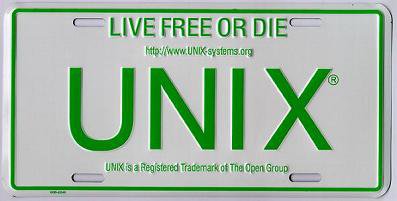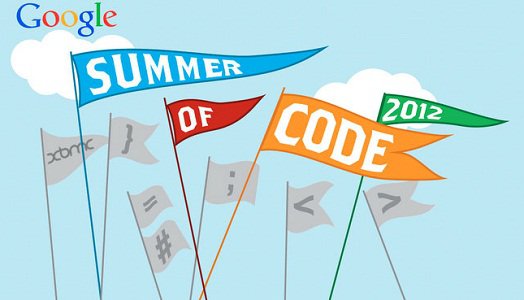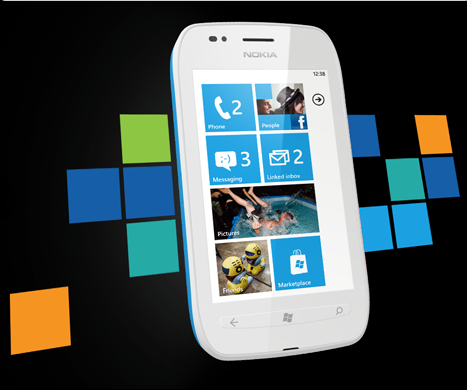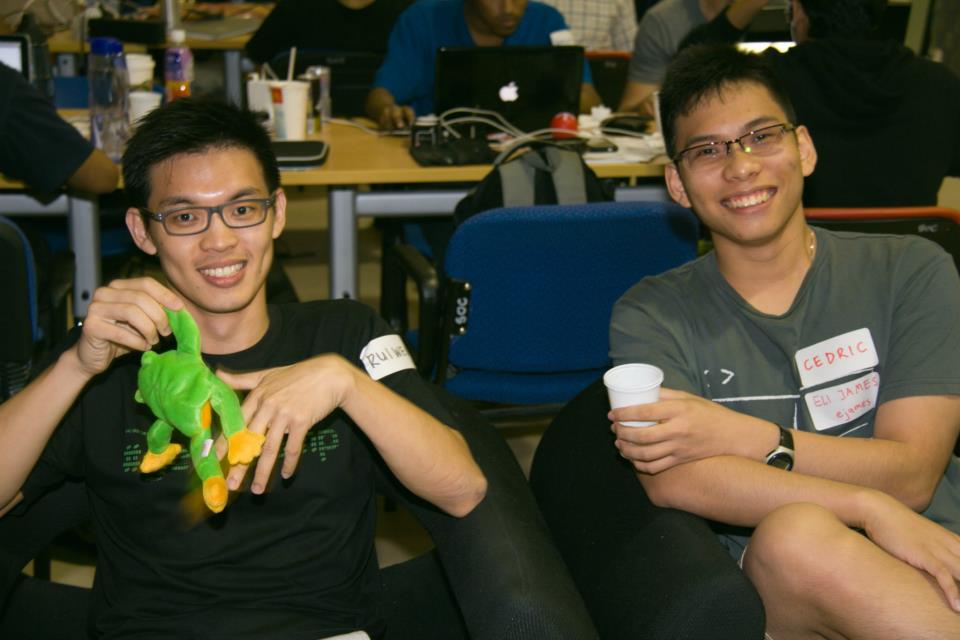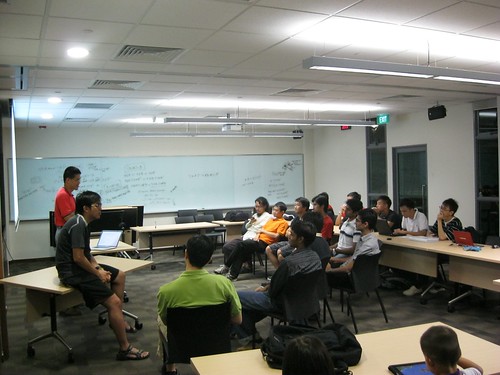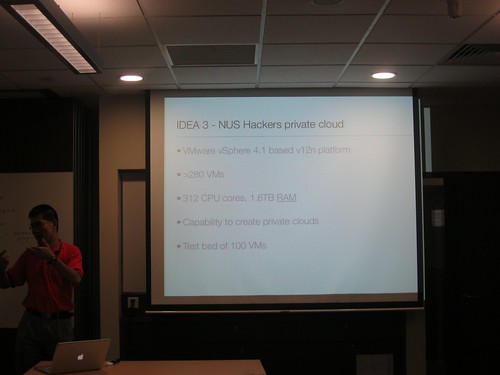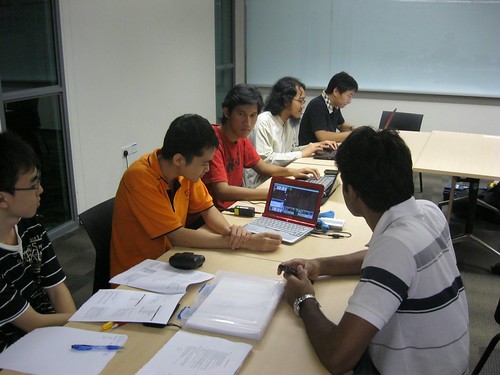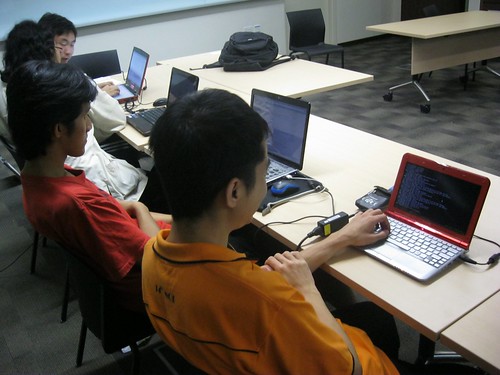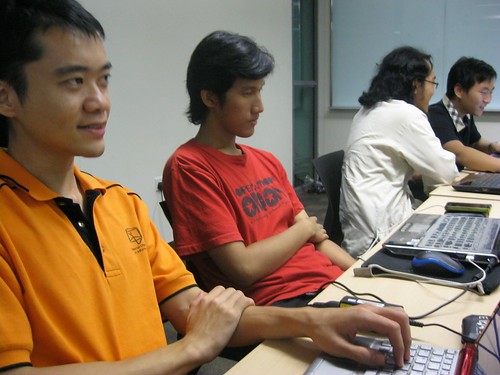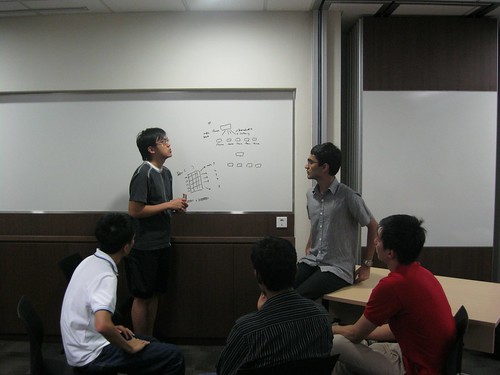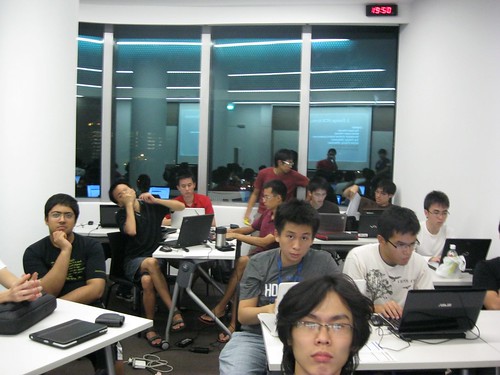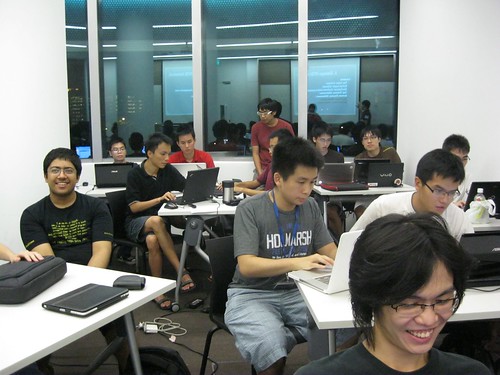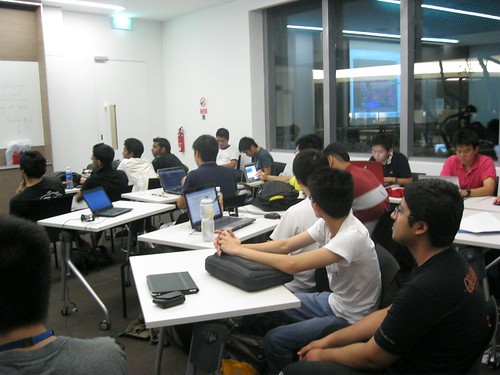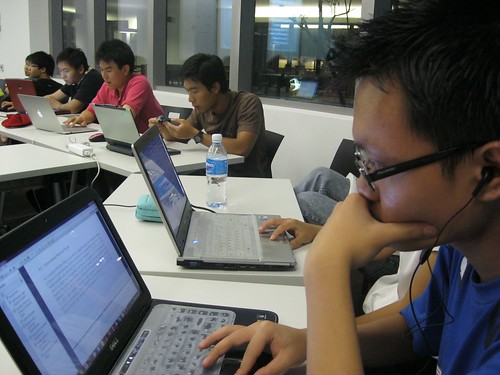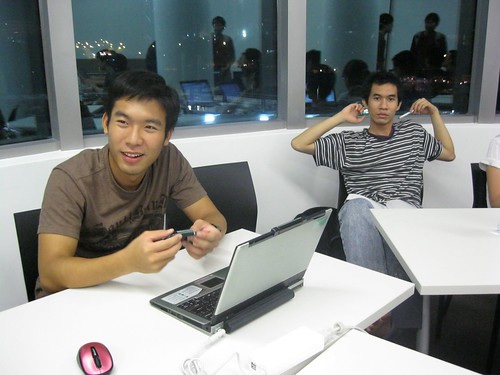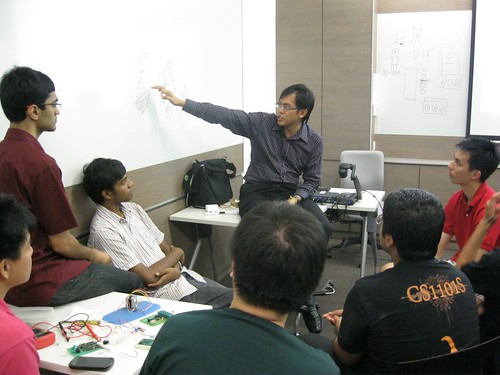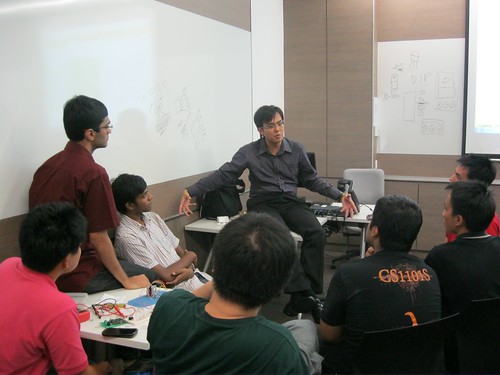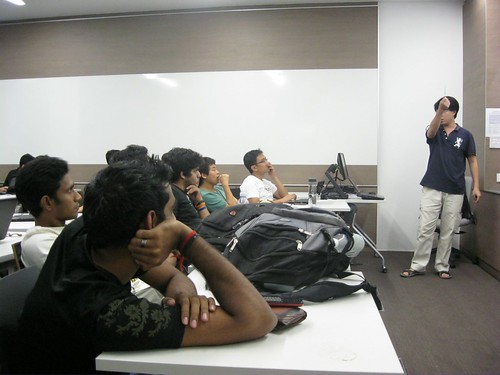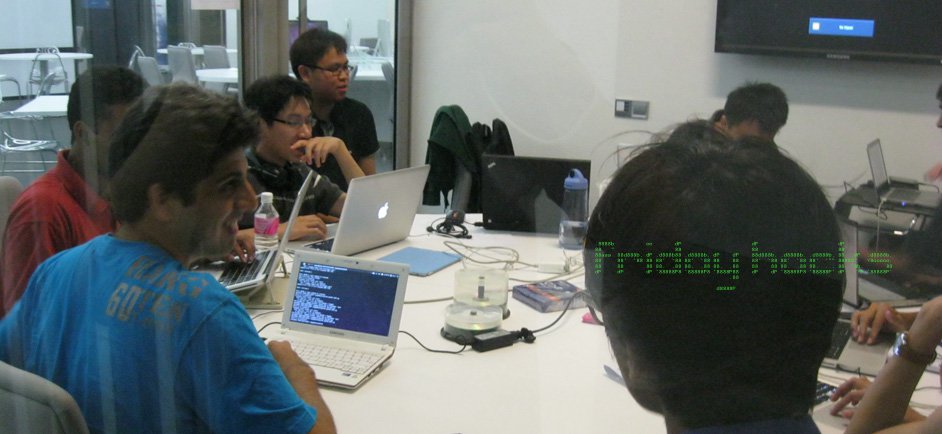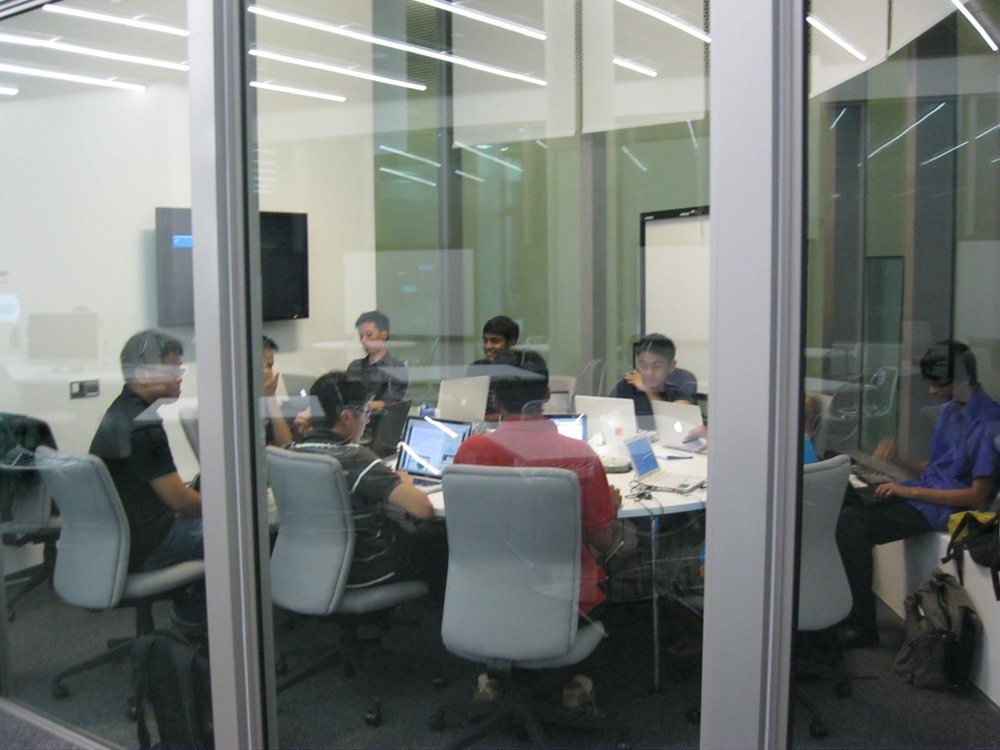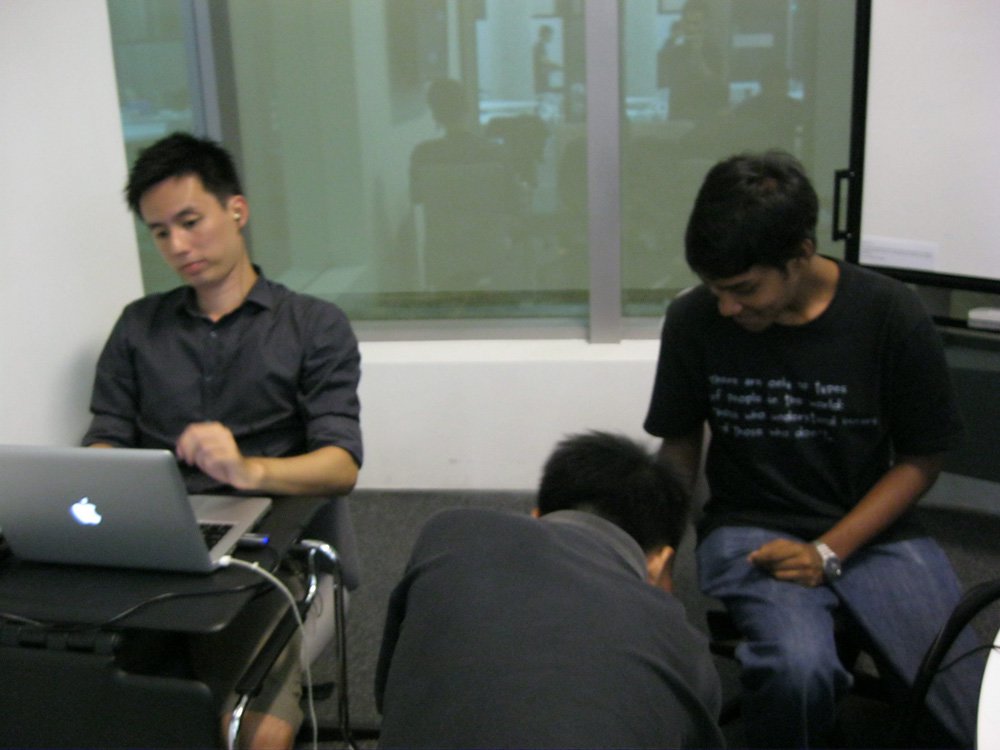Posts
Friday Hacks #129, March 3
Welcome back folks! We will be exploring cool hardware at our next Friday Hacks! Ever wondered what goes into building a laser cutter machine? Machine builder Kiwi will be doing a reverse teardown of a CO2 laser cutter! A team from Ionic3DP will also be sharing about their experiences in building their own 3D printers! You can look forward to live demos (:
Date/Time: Friday, March 3rd at 6:30pm
Venue: The Hangar by NUS Enterprise
Free pizza is served before the talks!
Facebook event here
Date/Time: Friday, March 3 at 7:00pm
Venue: The Hangar by NUS Enterprise
An Introduction to DIY Laser Cutters
Talk Description:
Laser cutting is a technology that uses a laser to cut materials, and is typically used for industrial manufacturing applications, but is also starting to be used by schools, small businesses, and hobbyists. Laser cutting works by directing the output of a high-power laser through optics and CNC (computer numerical control).
Common uses are cutting and engraving patterns onto materials such as wood, leather and acrylic, and is considered one of the faster processes in rapid prototyping. Join us for this sharing session to demystify the laser cutter machine!
Speaker Profile
Kee Wee Teng is an innovative machine designer and builder, and has worked on a multitude of fabrication machines, including CNCs, 3D Printers, vacuum formers and laser cutters. Dismayed by the slow decline of manufacturing capabilities in Singapore, he set out to set an example by building a machine in 6 months with limited resources and knowledge, able to do additive, subtractive, forming and cutting manufacturing, and showcased it at Makerfaire 2016. He hopes to inspire and encourage others in Singapore to adopt the same innovative Maker spirit that built early Singapore! Kee Wee was also recently featured in Challenge Magazine: https://www.challenge.gov.sg/print/feature/taking-things-into-their-own-hands
The Kappa 3D Printer
Talk Description:
Ionic3DP will be presenting their new 3D printer design which is based on Scott Russell Kinematics. Briefly talking about the existing products in the market and their limitations. An overview of the technology used in our design, it’s features and advantages. Finishing with how we began the project and our goal towards the future.
Speaker Profile
Francis Regan graduated from School of Computing NUS and has been working in the 3D printer industry for more than 7 years. Xinxin Du finished his PhD from ECE NUS recently and he is heavily involved in the projects related to automation and control. Shabbir received his MBA from Cardiff Business School, United Kingdom. His experience is more towards business and was with Techgrand to provide mentor supports to startups.
Friday Hacks #63, Feb 14
This Valentine’s evening, we have a exciting talk by Hongyi Li about his past work on Google Spanner & Image Search. See you!
Date/Time: Friday, February 14th at 6:30pm
Venue: SR2, Education Resource Centre, University Town; Map: //goo.gl/maps/2Zy3M
Signup: Do sign up for this week's talk so that we can prepare enough pizzas accordingly
Free pizza is served before the talks.
Talk: Spanner: Google's Globally Distributed Database
Talk Description:
Spanner is Google's scalable, multi-version, globally-distributed, and synchronously-replicated database. It is the first system to distribute data at global scale and support externally-consistent distributed transactions. This talk describes how Spanner works, how it's deployed, and what it's main advantages are.
Speaker Profile:
Hongyi worked as a product manager at Google from 2011 to 2013. During that time he worked on Spanner with the infrastructure team and the UI redesign of Image Search. He's currently back in Singapore working at IDA on a new team trying to make the government more data driven.
Friday Hacks #60, Jan 17
For our first talk of the semester, we have a talk by Cedric Chin. Do note the change in venue this time round, it’s going to be at the spanking new NUS Hackerspace! See you there
Date/Time: Friday, January 17th at 6:30pm
Venue: Hackerspace, #02-09, AS6, 13 Computing Drive, NUS
Free pizza is served before the talks.
Talk: Product Analytics: Building Something People Want
Talk Description:
Say you’ve built a digital product, and usage is bad. How do you know what to build next? How do you know how well your product is doing? The answer is to use analytics. But many metrics (number of downloads per day) are useless, and the useful ones are non-obvious. This talk details the minimum set of metrics every digital product needs to keep track of, with some implementation details, and lays out some of the principles I’ve found useful to come up with other metrics specific to your product. Equally important to keeping track of product analytics is the need to create culture - at the organisational level - to use these metrics. I’ll talk about how two companies I’ve worked at have succeeded or failed at using metrics in their product development, and outline a process I’ve seen work well for a small product development team. Come if you’re interested in building stuff people want to use.
Speaker Profile:
Cedric Chin (aka Eli James) interned at Viki in Summer ‘12, and Kicksend in Summer ‘13. He ran the NUS Hackers from 2011 to 2012.
Friday Hacks #52, Sept 20
This week we have a talk by Microsoft. Do note that we’ll be in Seminar Room 1, COM1 (NUS School of Computing) instead of at University Town for this session!
Date/Time: Friday, Sept 20 at 6:30pm
Venue: Seminar Room 1, COM1, School of Computing
Free pizza is served before the talk.
Talk: Acing the Technical Interview - Resume & Interview Tips
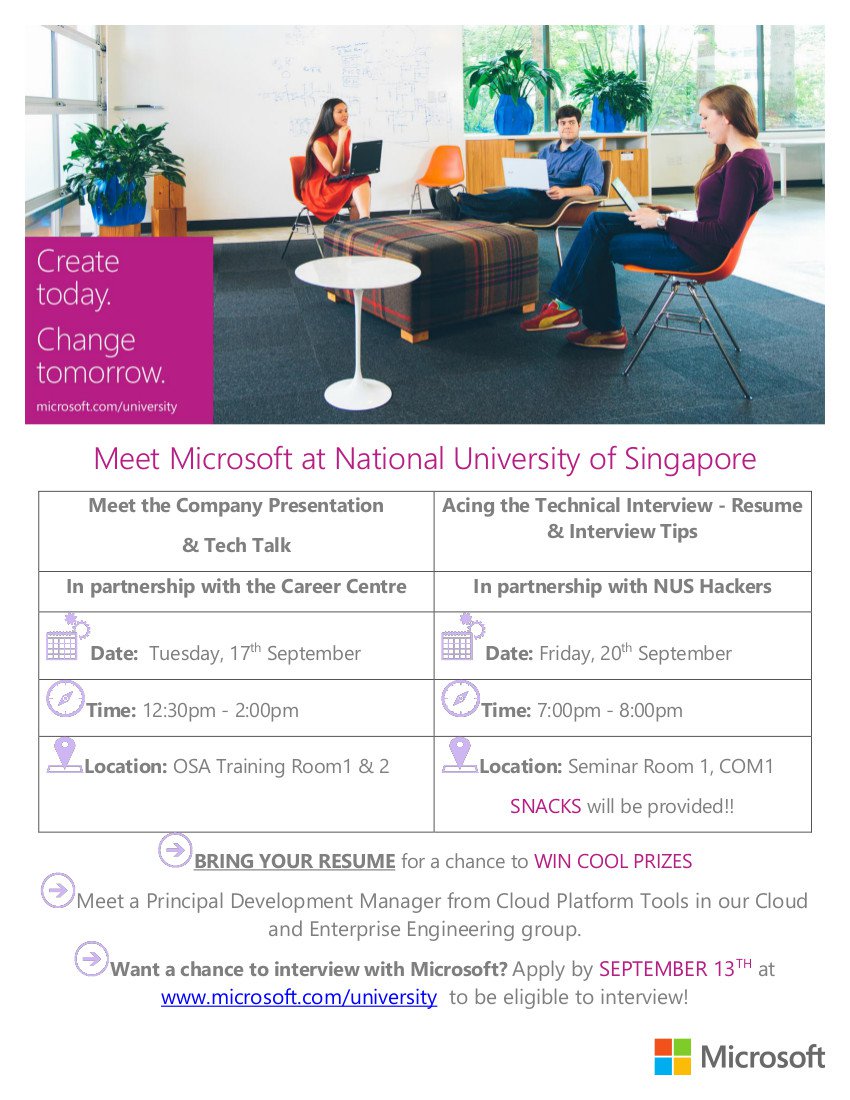
In addition, Microsoft will also be raffling off a Surface at the talk! Register here to be entered into the draw.
Friday Hacks #50, Aug 30
This week we have a talk by Fazli Sapuan followed by a series of ad-hoc lightning talks by members of the community.
Date/Time: Friday, Aug 30 at 6:30pm
Venue: SR2, Education Resource Centre, University Town. Map: //goo.gl/maps/2Zy3M
Free pizza is served before the talks.
Talk: How I am stalking you – the NUS LDAP directory (Fazli Sapuan – Student)
Talk Description:
Fazli will talk about the Lightweight Directory Access Protocol (LDAP), a technology from 1993 still in popular use by enterprises and other organizations like NUS. He will be showcasing his web app which has the ability to perform a student lookup search and list information about the student such as the course and year, the modules being read and the location of his residence in campus. The source code of the app will be published for the NUS hacking community.
Speaker Profile:
Fazli likes to hack random projects for fun and without any apparent reason. He doesn’t like to talk about security hacking, but if he has to then he is a self-proclaimed grey hat. Fazli believes that what he did here does not constitute as security “hacking”, and that the app was not unethical in any form. Fazli is awesome. He totally did not write this blog post, Wordpress is lying.
About Lightning Talks
NUS Hackers is currently transitioning from weekly tech talks to a more community-involved format. As such, we are currently experimenting with new ideas. The new ideas may or may not work but the plan is we will always have something familiar to fall back on even if they fail.
More information about the lighting talks will be available later.
Friday Hacks #39, Feb 1
This week we have Michael Yong and Gaurav Chandrashekar, two NUS students who have or will be interning at interesting tech companies. Michael will be sharing about lessons he learnt from passing the Quora and Google interviews, and Gaurav will be talking about his experiencing working on localization at Spotify.
Date/Time: Friday, February 1 at 6:30pm
Venue: SR2, Education Resource Centre, University Town. Map: //goo.gl/maps/2Zy3M
Sign up here: //bit.ly/fridayhacks2013
Free pizza is served before the talks.
Talk 1: Getting that internship: what I learnt. (Michael Yong, NUS Student)
Talk Description:
I'll be sharing my experience and the lessons learnt throughout the entire internship application process.
I’ll also be talking about what I did to prepare for the technical interviews, and what I think made the difference in my application.
Speaker Profile:
Michael is a second year Computer Science undergraduate at NUS. He’ll be interning at Google and Quora in the coming summer and is extremely excited. He is also the current President of NUS Hackers.
Talk 2: An Internship Experience: Localization at Spotify (Gaurav Chandrashekar, NUS Student)
Talk Description:
As services online expand to new countries, its critical that they are offered in new languages. However, there are challenges that needs to be addressed when you are translating your service to a new language. We'll touch on these and I'll also go into my brief experiences.
Speaker Profile:
Gaurav Chandrashekar, currently a senior at NUS, spent 4 months at Spotify, Stockholm, in knowing more about localization and setting up translation platform for them.
==============================
Please sign up at //bit.ly/fridayhacks2013
For a map, more details, as well as guidelines on giving a talk on Friday Hacks, see //nushackers.org/fridayhacks/
For more info on NUS Hackers, See: //nushackers.org/about
For more Friday Hacks talks: //nushackers.org/
Friday Hacks #38, Jan 25
This week, we have Michael Cheng, convener of the Singapore PHP user group talking about rapid prototyping in PHP, and Omer Iqbal, an NUS Student who will be talking about Clojure.
Date/Time: Friday, January 25 at 6:30pm
Venue: SR2, Education Resource Centre, University Town. Map: //goo.gl/maps/2Zy3M
Sign up here: //bit.ly/fridayhacks2013
Free pizza is served before the talks.
Talk 1: Rapid Prototyping with PHP - The world of TDD, BDD and frameworks in PHP-land (Michael Cheng, Senior Software Engineer at mig33)
Talk Description:
A quick overview of the state of modern day PHP development in the real world. An introduction of frameworks available and some nifty tricks and best practices you need to make it in a rapidly changing startup environment.
Speaker Profile:
Michael Cheng has more than 10 years of experience using PHP to build dynamic websites. He is the convener of the Singapore PHP User Group and a Zend Certified Engineer/Trainer in PHP development.
Michael is currently a Senior Software Engineer with a local mid-sized startup called mig33 - a social entertainment platform - that’s popular in emerging economies like Indonesia and Nepal.
Talk 2: Clojure - The Return of The Lisp (Omer Iqbal, NUS Student)
Talk Description:
Clojure combines the elegance of lisp with strong pragmatism. Its one of the few functional programming languages, along with Haskell, Erlang and Scala that have managed to crawl to the industry, and that's primarily because of its brilliant concurrency primitives, seamless interop with Java and very friendly community.
I’ll be giving a whirlwind tour of the language, covering the basic syntax (which is minimal, by virtue of being a lisp!), java interop, a few concurrency primitives, macros, writing a simple web server using Ring, and making some live noise with Overtone.
Prep:
No need to prepare, but I’ll be doing some live coding and it would help to install leiningen 2.x(https://github.com/technomancy/leiningen) if you want to join in the action. Lein is a dependency manager, a build tool, and an awesome fire exhaust when your hair ignites after classpath errors.
Speaker Profile:
Omer loves Koolaid, and the effects last for a while on him. His interests include web dev, embedded systems, cheap coffee (from the Koufu drinks stall!) and flamewars.
==============================
Please sign up at //bit.ly/fridayhacks2013
For a map, more details, as well as guidelines on giving a talk on Friday Hacks, see //nushackers.org/fridayhacks/
For more info on NUS Hackers, See: //nushackers.org/about
For more Friday Hacks talks: //nushackers.org/
Friday Hacks This Week Moved to LT19
Due to incredible demand, this week’s Friday Hacks (9th November) with Quora recruiting and Winston Teo has been moved to LT19, next to the Business Canteen. Here’s a map to the new location: //bit.ly/nus-lt19
The easiest way to get to LT19 is to drop off at the School of Computing bus stop, enter COM2, and then walk through the business canteen. The lecture theatre is located directly opposite the COM2 entrance.
Over 100 people have registered. This event is open to the public.
As a reminder, the talk starts promptly at 7pm. Food will be served after the two talks have concluded.
Friday Hacks #35, Nov 9

This week we have Quora, a Silicon Valley startup, coming to NUS for recruitment purposes, and Winston Teo from {new context} on Software Engineering as a career choice.
To sign up for this talk, and to apply for job opportunities at Quora, please register at this link: //bit.ly/quora-tech-talk Seats are limited!
Date/Time: Friday, November 9 at 7.00pm
Venue: SR3 (Level 2), School of Computing, National University of Singapore. Map: //goo.gl/maps/KgzPT
Venue changed to LT19, COM2, National University of Singapore. Map: //bit.ly/nus-lt19
Food is served after the talks.
Job opportunities
Quora is hiring for full-time and internship positions in the US, especially for software engineering and product design roles. If you’re interested in opportunities at Quora, do submit your application at //www.quora.com/jobs and definitely drop by for the talk! You can also direct any questions to sg@quora.com.
Talk 1: Engineering at Quora: Building a Real-Time Platform with LiveNode and Webnode (Hongping Lim, Kah Hong Tay, Quora)
Hongping Lim, Software Engineer and Kah Hong Tay, Product Designer-- will be talking about Quora's technology stack and engineering challenges.
About Quora
Quora is a continually improving collection of questions and answers created, edited and organized by everyone who uses it. The company’s mission is to share and grow the world’s knowledge, and was founded in 2009. Adam D’Angelo, the former CTO of Facebook, is founder and CEO.
Talk 2: Software Engineering 6501 (Winston Teo, New Context)
Talk Description:
Do you want to be a Software engineer? Software Engineering is not only about programming languages, algorithms, networks and databases. It's about creating value, getting things done, and constant communication. I'll be talking about why someone should become a software engineer and what I think it takes to be a good software engineer. Nothing technical, but you'll not learn this from lectures and tutorials.
Speaker Profile:
Winston is an Alumni of NUS School of Computing, class of 2006. He started his career in IBM as a database administrator but soon realized that he loves web development a little bit more. He made the switch to become a Web Ninja at Wego.com in 2008 and has not looked back since. Currently a software engineer with New Context, he has helped build applications such as Friendster.com and Viki.com. To him, software engineering is more Art than Science, and he derives immense pleasure from building products that people need.
==============================
Please sign up at //bit.ly/quora-tech-talk Seats are limited!
For a map, more details, as well as guidelines on giving a talk on Friday Hacks, see //nushackers.org/fridayhacks/
For more info on NUS Hackers, See: //nushackers.org/about
For more Friday Hacks talks: //nushackers.org/
Friday Hacks #34, Nov 2
This week we have two NUS alumni speaking at Friday Hacks. The first talk will be held by Joshua Koo from Zopim, and three.js contributor. The second talk, held by Sivamani Varun, founder of Semantics3, will be speaking about distributed web crawlers.
Location: COM1 SR3 [COM1/212]
Time: 7pm - 9pm.
Talks start promptly at 7pm. You are welcome to stay and mingle (or hack!) after the talks.
Talk 1: Jump Start in three.js
Talk Description:
three.js is a really (if it hasn’t been the most) popular javascript library 3d. Its applications ranges from a just a simple graphic library, to games, visualizations, product enhancements, to even medical field.
Learn to get started, and explore some of the capabilities of this library. Hears tips on common pitfalls and tricks developing with three.js. Get your hands dirty experimenting with examples and exploring a new world of three.js on your web browser..
Preparation:
To have an idea of three.js, one can checkout https://github.com/mrdoob/three.js/
You would probably only need an updated modern browser (Chrome or Firefox), preferably with a decent graphics unit.
Having your favorite text editor, git and your usual development tools would be a plus.
Speaker Profile:
Among his many interests, he loves creative coding, photography, sports and classical music. He graduated from the school of computing, majored in information systems, and is also an alumni of the NUS Overseas College (SV) and the NUS Symphony Orchestra. After graduating, he joined the teaching staff for the CS3217 (software engineering with iPad). After which he started worked for a silicon valley startup before joining an award winning local startup Zopim (//zopim.com) to help engineer their live chat product towards perfection. In his spare time, he explores realtime browser based experiments, as well as contributing to the open source community, including three.js.
Talk 2: Building a Distributed Web Crawler
Talk Description:
In this talk, I will be talking about doing large scale web crawling and the challenges involved. I will then talk about building your own distributed web crawler.
Preparation:
Previous experiences with cloud computing services like AWS would be great. Prior knowledge in distributed computing, messaging mechanisms would be beneficial, though not required.
Speaker Profile:
Sivamani Varun is the founder of Semantics3. While not dabbling in technical things or talking to customers, he is an aspiring mariner and is a big movie buff. He is a proud NUS alum and holds a bachelors in Computer Engineering.
==============================
Please sign up at //bit.ly/friday-hacks
For a map, more details, as well as guidelines on giving a talk on Friday Hacks, see //nushackers.org/fridayhacks/
For more info on NUS Hackers, See: //nushackers.org/about
For more Friday Hacks talks: //nushackers.org/
Friday Hacks #32, Oct 12
This week we have Melvin Zhang from Hoiio on improving AI, and Shan and Rahul on Field-Programmable Gate Arrays.
Please sign up at //bit.ly/friday-hacks
Location: COM1 SR3 [COM1/212]
Time: 7pm - 9pm.
Talks start promptly at 7pm. You are welcome to stay and mingle (or hack!) after the talks.
Talk 1: Playing Games by Throwing Dice: Improving AI through Randomness (by Melvin Zhang of Hoiio)
Talk Description:
How do programs play games at the level of the best human players? Can the use of random moves create stronger AI opponents? This talk is an introduction to the basics of game playing AIs. In additional to classic methods, such as retrograde analysis and minimax, we’ll also describe an exciting new method that exploits random moves.
This talk is based on Melvin’s experience developing an AI to play the collectible card game, Magic: the Gathering, as part of the Magarena project.
Speaker Profile:
Melvin is a programmer at Hoiio, where he is building APIs that allows developers to easily add telephony capability to their apps. In his spare time, Melvin maintains an open source card game named Magarena.
Melvin received his B.Comp (Hons) and Ph.D. degrees from NUS School of Computing.
Talk 2: FPGAs: Why Write Code When You Can "Write" Hardware! (Shan and Rahul, NUS Students)
Talk Description:
This talk will be a brief introduction to the world of user-configurable hardware, specifically Field-Programmable Gate Arrays. These devices can be configured by the end user to perform any function, from a simple set of logic gates to a full-blown microprocessor. We will also talk about hardware acceleration of algorithms. Many commonly-used processing algorithms (such as AES, PRESENT and those in the h.264 codec) are fairly expensive to do in software, and can benefit greatly from hardware acceleration. Just how much of a speedup does hardware acceleration provide? Attend the talk and find out :D
Preparation:
Attendees unfamiliar with the concept of a logic gate are encouraged to read up before the talk.
Speaker Profile:
Shan and Rahul are final year Electrical Engineering students at NUS. Both are open-source advocates, and waste their recess weeks trying to find a Linux distro that isn’t terrible.
Shan can almost always be spotted engulfed in either his Android or his laptop. If not currently engaged by a gadget that is powered up, he would either be tearing it apart to figure out how it works, or to hack it to make it harder, better, faster, stronger!
Rahul prefers to spend his time filling his storage devices with code, some useful and some utterly useless. He has a penchant for dropping down to assembly… because C is too high-level, though his latest escapades involve GPGPU programming and image processing.
Please sign up at //bit.ly/friday-hacks
For a map, more details, as well as guidelines on giving a talk on Friday Hacks, see //nushackers.org/fridayhacks/
For more info on NUS Hackers, See: //nushackers.org/about
For more Friday Hacks talks: //nushackers.org/
Fridiay Hacks #31, Oct 5
This week we have Andy Marks from ThoughtWorks on Continuous Delivery, and Calvin Cheng, from the robotics startup CtrlWorks on building a telepresence robot.
Please sign up at //bit.ly/friday-hacks
Location: COM1 SR3 [COM1/212]
Time: 7pm - 9pm.
Talks start promptly at 7pm. You are welcome to stay and mingle (or hack!) after the talks.
Talk 1: Andy Marks (of software consulting firm ThoughtWorks)
Talk Description:
Continuous Delivery is a 100% buzzword-compliant term used to describe the natural extension of Agile/Lean thinking into deployment of software. DevOps is a movement attempting to break down functional silos in organisations that need to deploy software. They are often used synonymously but the differences are far more subtle and subjective.
Speaker Profile:
Andy Marks is a 13-year veteran of ThoughtWorks and Technical Principal for the Singapore office, having previously been Market Technical Lead for the Melbourne and Perth offices in Australia. Andy has significant experience leading, coaching and working in Agile software development teams. In his various roles within ThoughtWorks, he has been involved in solution delivery, DevOps, continuous deployment on AWS platforms, coaching and mentoring team.
Andy is also the organiser for DevOps Singapore - a local meetup group that meets monthly to talk all things DevOps.
Talk 2: Building a telepresence robot (Sim Kai and Calvin Cheng,CtrlWorks)
Talk Description:
We will talk about the telepresence robot that we are working on, where we think the future is, and the technical challenges that we have encountered along the way.
Speaker Profile:
Kai used to work in the robotics team at ST Kinetics and has a keen interest to see how personal robotics can make a positive difference in everyday lives.
Calvin has more than 15 years experience working on large scale software systems at Yahoo, Sun, and Oracle. He is very interested in robotics because it bridges between our physical and virtual worlds.
==============================
Please sign up at //bit.ly/friday-hacks
For a map, more details, as well as guidelines on giving a talk on Friday Hacks, see //nushackers.org/fridayhacks/
For more info on NUS Hackers, See: //nushackers.org/about
For more Friday Hacks talks: //nushackers.org/
Friday Hacks #30, Sep 21
This week we have Andy Croll, CTO at impulseflyer.com and the organiser of RedDotRubyConf, and Kwok Pan, a product designer who dabbles in programming.
Please sign up at //bit.ly/friday-hacks
Location: COM1 SR3 [COM1/212]
Time: 7pm - 9pm.
Talks start promptly at 7pm. You are welcome to stay and mingle (or hack!) after the talks.
Talk 1: Sweat the Details (Andy Croll, CTO of impulseflyer.com)
Talk Description:
Design is communication, empathy and human understanding. The tiny things make all the difference in the tools and technologies you will be creating for the rest of your lives. Learn to take pride in the little things.
Speaker Profile:
One of Singapore’s most sought after designers & developers. User-experience-focussed, web-designing, ruby programming, startup-ing, Singapore-based Brit.
Talk 2: From Art to App
Talk Description:
Synthesizing Design and Code in Installations, Mobile Apps and 3D Printing increased accessibility between different fields of knowledge have resulted in exciting innovations in recent years. This talk will cover the emerging field of creative coding, the synthesis between design and programming as related to my work. I will talk about some of the processes I used to program a light installation for W Hotel, to create a system of 3D printed vases and to make a camera filter app for the iPhone. It will include insights and learnings from both a high level perspective as well as actual details with hands-on demonstrations. Throughout the talk, I will also touch on how I approach and learn programming as someone whose background is primarily in design.
Preparation:
There is no required preparation but it will be helpful to look at a Java-based programming framework called Processing (//www.processing.org/) and some of the works in the exhibition section of the website. That was how I got started and I will use it for some demonstrations as well. Creative Applications (//www.creativeapplications.net/) is a good website to look at too.
Speaker Profile:
Kwok Pan graduated two years ago from the School of Art, Design and Media, NTU, with First Class Honours in Product Design. Since then, he has been working to explore his vision of design and code working hand in hand to create original works in both physical products and interactive applications. His works in 3D Printing have been featured in magazines such as Casa Vogue Brasil, Surface Asia, and The American Scholar, as well as major design websites such as designboom, Fast Company (Co.Design) and NOTCOT. More recently, his venture into the world of iPhone applications, a camera app called Meta (www.app-meta.com), were picked up by The Guardian, Cult of Mac and Life in LoFi.
==============================
Please sign up at //bit.ly/friday-hacks
For a map, more details, as well as guidelines on giving a talk on Friday Hacks, see //nushackers.org/fridayhacks/
For more info on NUS Hackers, See: //nushackers.org/about
For more Friday Hacks talks: //nushackers.org/
Friday Hacks #29, Sep 14
This week we have Sourabh Rao, an NUS student who programs for fun (and has done some impressive things outside of school!), and Michael Li, a Research Officer from the Data Analytics Department, National Business Analytics Center.
Please sign up at //bit.ly/friday-hacks
Location: COM1 SR3 [COM1/212]
Time: 7pm - 9pm.
Talks start promptly at 7pm. You are welcome to stay and mingle (or hack!) after the talks.
Pizza is served after the talks. Attendees are encouraged to have a light dinner before the event.
Talk 1: Crawling and sentiment analysis: practical hacks with Python (Sourabh Rao, NUS Student)
Talk Description:
I'll be talking on sentiment analysis, the theoretical nitty gritty of it and how it can be used in practical projects. I'll also be introducing a project I am working on to build a pandora like music player which uses the concept of sentiment analysis to build music libraries.
Prep:
I’ll be starting from scratch. I assume a basic understanding of programming.
Speaker Profile:
I am a freshman at NUS. I was a SRP researcher at NUS during Junior College and worked on genetic algorithms. I founded a profitable question answering portal called sqare. I was also fortunate to have spent a quarter at MIT during which I was exposed to ideas of sentiment analysis. Currently, I am an engineering intern at semantics3.
Talk 2: Making Sense: Introduction to working with ontologies (Michael Li, Research Officer, Data Analytics Dept, NBAC)
Talk Description:
Ontologies are a different way to store data and knowledge as compared to the conventional model of using databases. This talk and hands-on session will be an introduction to using ontologies and demonstration of why we use it (and like it!)
Speaker profile:
Michael Li is a research engineer in Institute for Infocomm Research whose work is in semantic technology and focused towards the healthcare industry.
He graduated from University of Melbourne with a Biomedical Engineering Degree specializing in Bioinformatics.
Please sign up at //bit.ly/friday-hacks
Friday Hacks #28, Sep 7
This week we have Thomas Gorissen, web developer and organiser behind JSCamp, and Tan Liling, an NTU graduate student working on word sense disambiguation.
We are making one change this week:
- We are going to serve pizza after the talks, not before, to encourage more relaxed mixing with speakers. Attendees are encouraged to eat a light dinner before the event.
So the updated event details:
Location: COM1 SR3 [COM1/212]
Time: 7pm - 9pm.
Talks start promptly at 7pm. You are welcome to stay and mingle (or hack!) after the talks.
Talk 1: The technology behind the online advertisement machine (Thomas Gorissen, JSCamp organizer)
Talk Description:
You're visiting websites that show display advertisements many times a day and every time, millions of times a day, a complex real-time process involving hundreds of requests to different servers of different companies is triggered. In an effort to show you the most valuable message at the time of your visit, your ad-impression opportunity is literally traded in the background in a way that closely mimics a financial stock market. It is a massive, for the consumer invisible machine, involving the biggest internet companies, you've never heard of.
Prep:
A basic understanding of the way the internet works (web programming, servers, clients, requests, cookies) is required.
Speaker profile:
Thomas is a web developer 14 years in the making. He has lived and helped startups in Germany, Panama, Singapore and the US with his experience in technology, architecture and design. Currently he is working for ADZ, the online audience marketplace for Asia (
//www.adzcentral.com) as Technologist. As the first employee he helped design and build ADZ advertisement technology stack from the ground up.
Talk 2: Do computers REALLY understand the human language? (Tan Liling, NTU Graduate Student)
Talk Description:
A brief introduction on Natural Language Processing, giving an overview of the science behind the technology that uses NLP. The talk is meant to be introductory and giving a brief overview of the different small parts that makes an NLP application like Siri works. Nothing in-depth will be discussed and if necessary more can be explained off- the presentation or during the QnA.
Speaker Profile:
I am a graduate student from NTU working on my thesis on word sense disambiguation. I deal with mostly the "knowledge" side of NLP rather than the "speech" side, so I do know a little from the courses I've taken on speech technology ( voice recognition, synthesizers, speech corpora, and processing) but I know just enough to talk about it generally. What I do is mostly on letting the computer understand grammar and meaning of human language, sometimes it involves applying some machine-learning techniques and statistics but most times, it is to think of novel ways to impart knowledge to computers.
Friday Hacks #27, Aug 31
This week we have Angad Singh, here to talk about the research he did while at Stanford for NOC, and Michael Caronna, a professional photographer who built an automated motion-tracking camera stand.
Talk 1: Mininet: a network in your laptop (Angad Singh, NUS Student)
Talk Description: Multiple network paths are available today on one computer or mobile device - such as WiFi, 3G and LTE. The idea is to use all of them simultaneously to provide bandwidth aggregation (a fat pipe).



